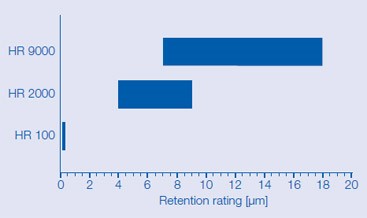Order Products
Seitz® HR Series Depth Filter Sheets, HR 2000 600x612 OL in cartons
50/EA
50
For cellulase enzyme filtration
Seitz HR Series Depth Filter Sheets were developed to meet the industrial enzyme industry's production needs and requirements. These homogenous and consistent media include surface, depth and adsorptive filtration coupled with a positive zeta potential. So you get excellent filtrate quality, especially due to the retention of negatively charged particles. Due to surface modification and polyolefin fibers' presence, the resulting structural properties lead to improved sealing and reduced edge losses. While the high wet strength and media composition make them easy to remove and resistant to cellulose-degrading enzymes. Available in multiple grades and include:
Product images are a representation of product family for illustration purposes only. Actual products may vary.
Fine filtration and reduction of microorganisms in cellulase enzyme solutions
Cellulase enzyme clarification and fine filtration
Diatomaceous earth (DE) support sheet for cellulase enzyme filtration. Coarse filtration of cellulase enzymes
Nominal Retention1

1Measured under laboratory test conditions. Removal performance of filter sheets is nominal and dependent on process conditions. There is no standardized method among manufacturers for its characterization.
Food Contact Compliance
Please refer to the Pall website for a Declaration of Compliance to specific National Legislation and/or Regional Regulatory requirements for food contact use.
Main Constituents
Polyolefin fibers, cellulose, diatomaceous earth (DE, Kieselguhr), and perlite
Characterization
| Grade | Mass per Unit Area g/m2 |
Thickness mm |
Ash % |
Water Permeability2 L/m2/min (gal/ft2/min) |
|---|---|---|---|---|
| HR 100 | 1360 | 3.9 | 46 | 51 (1.2) |
| HR 2000 | 1220 | 3.9 | 45 | 350 (8.6) |
| HR 9000 | 1200 | 4.8 | 45 | 1550 (38.1) |
These figures have been determined in accordance with in-house test methods and the methods of the Technical / Analytical Work Group within the European Depth Filtration Association.
2The permeability was measured under test conditions with clean water at 20 °C (68 °F) and a Δp of 1 bar (14.5 psi).
Cellulase Resistance
Seitz HR and standard Seitz K series filter sheets were tested for their resistance to cellulase under controlled laboratory conditions. After immersion, the burst force of the samples was measured.

HR sheets exhibit high wet strength when exposed to cellulase enzymes.
Sterilization and Sanitization
| Method | Temperature °C (°F) | Maximum Differential Pressure bar (psi) | Time3/ Cycle min |
|---|---|---|---|
| Steam | 125 (257) | 0.5 (7.2) | 20 |
| Hot Water | 90 (194) | 1 (14.5) | 30 |
3The actual time required may vary as a function of the process conditions.
Filtration Guidelines4
As the filtrate quality can be impacted by the filtration flow rate, the following table provides flux rate guidelines. Please contact Pall for recommendations on your specific filtration process as results may vary by product, pre-filtration and filtration conditions.
| Application | Flow Velocity L/m2/h (gal/ft2/h) | Maximum Differential Pressure bar (psi) |
|---|---|---|
| Bacteria load reduction from cellulase enzymes | 525 (12.9) | 1.5 (21.8) |
| Cellulase enzyme fine filtration | 525 (12.9) | 3 (43.5) |
| Clarification of cellulase enzymes | 850 (20.9) | 3 (43.5) |
| Coarse filtration of cellulase enzymes | 850 (20.9) | 3 (43.5) |
4Please contact Pall for recommendations on your specific filtration process as results may vary by product, pre-filtration and filtration conditions.
For additional operating guidelines, including rinsing of sheets prior to use, please refer to instructions provided by Pall.
Quality